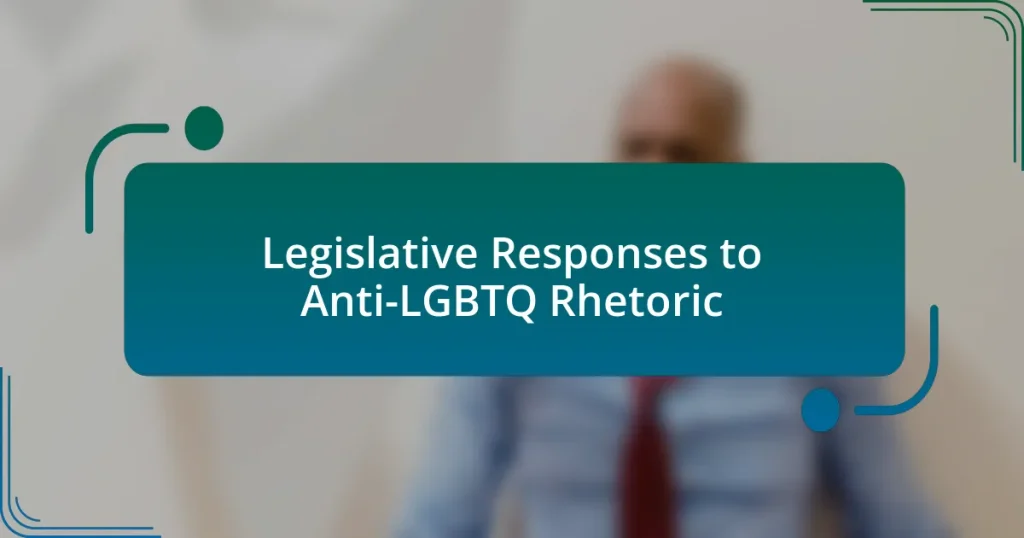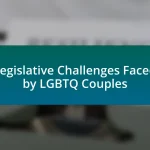The article focuses on legislative responses to anti-LGBTQ rhetoric, detailing the introduction and passage of laws designed to protect LGBTQ rights and combat discrimination. It examines the variation in legislative measures across different regions, influenced by cultural attitudes and political climates, and highlights the effectiveness of such laws in reducing anti-LGBTQ violence. Key categories of legislation discussed include non-discrimination laws, hate crime enhancements, and protections for LGBTQ youth. The article also addresses the challenges legislators face, the role of public support, and the impact of misinformation on legislative efforts, emphasizing the importance of advocacy and community engagement in promoting equality and safeguarding rights for LGBTQ individuals.
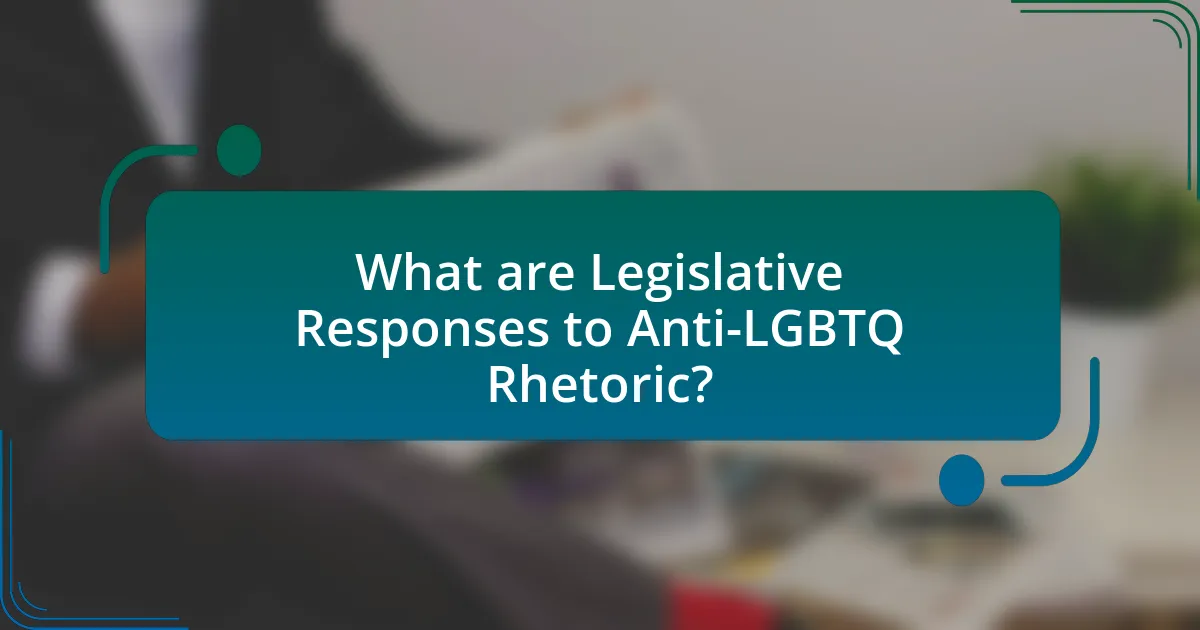
What are Legislative Responses to Anti-LGBTQ Rhetoric?
Legislative responses to anti-LGBTQ rhetoric include the introduction and passage of laws aimed at protecting LGBTQ rights and countering discrimination. For example, many states have enacted non-discrimination laws that prohibit discrimination based on sexual orientation and gender identity in employment, housing, and public accommodations. Additionally, some legislatures have proposed or passed bills that specifically address hate crimes against LGBTQ individuals, enhancing penalties for such offenses. Research from the Williams Institute indicates that states with comprehensive non-discrimination protections experience lower rates of anti-LGBTQ violence. These legislative measures serve as a direct counter to anti-LGBTQ rhetoric by affirming the rights and dignity of LGBTQ individuals.
How do legislative responses vary across different regions?
Legislative responses to anti-LGBTQ rhetoric vary significantly across different regions, reflecting diverse cultural, political, and social contexts. For instance, in North America, many states have enacted laws that protect LGBTQ rights, such as marriage equality and anti-discrimination measures, driven by public support and advocacy from organizations like the Human Rights Campaign. Conversely, in parts of Eastern Europe and Africa, legislative responses often include the introduction of laws that criminalize LGBTQ identities and behaviors, influenced by conservative political ideologies and societal norms. A notable example is Uganda’s Anti-Homosexuality Act, which imposes severe penalties for LGBTQ individuals, highlighting the stark contrast in legislative approaches. These regional differences underscore how local values and political climates shape the legal landscape for LGBTQ communities.
What factors influence the effectiveness of these legislative responses?
The effectiveness of legislative responses to anti-LGBTQ rhetoric is influenced by public support, the political climate, enforcement mechanisms, and the clarity of the legislation. Public support is crucial; studies show that legislation backed by a majority of constituents is more likely to be effectively implemented and upheld. The political climate, including the presence of supportive leadership and a favorable judiciary, can either bolster or hinder the enforcement of such laws. Enforcement mechanisms, such as funding for implementation and training for law enforcement, directly impact how well the legislation is executed. Lastly, the clarity of the legislation itself determines how easily it can be interpreted and applied, with well-defined laws reducing ambiguity and increasing compliance.
How do cultural attitudes shape legislative actions?
Cultural attitudes significantly influence legislative actions by shaping public opinion, which lawmakers often consider when drafting and voting on laws. For instance, in regions where conservative cultural attitudes prevail, legislation may reflect anti-LGBTQ sentiments, resulting in laws that restrict rights or protections for LGBTQ individuals. A notable example is the passage of “bathroom bills” in several U.S. states, which were driven by cultural beliefs about gender identity and public safety. Research from the Williams Institute indicates that states with higher levels of anti-LGBTQ sentiment are more likely to enact discriminatory laws, demonstrating a direct correlation between cultural attitudes and legislative outcomes.
Why is it important to address anti-LGBTQ rhetoric through legislation?
Addressing anti-LGBTQ rhetoric through legislation is crucial to protect the rights and dignity of LGBTQ individuals. Legislation can create a legal framework that prohibits discrimination and hate speech, thereby fostering a safer environment for marginalized communities. For instance, studies show that regions with anti-discrimination laws experience lower rates of hate crimes against LGBTQ individuals, highlighting the effectiveness of legal measures in reducing violence and discrimination. Furthermore, legislation can promote societal acceptance by signaling that anti-LGBTQ rhetoric is not tolerated, which can lead to broader cultural shifts towards inclusivity and respect.
What are the potential consequences of inaction?
The potential consequences of inaction regarding anti-LGBTQ rhetoric include the perpetuation of discrimination, increased mental health issues among LGBTQ individuals, and the erosion of civil rights protections. Without legislative action, discriminatory practices may continue unchecked, leading to a hostile environment for LGBTQ communities. Studies indicate that LGBTQ individuals face higher rates of depression and anxiety when subjected to societal stigma, which can be exacerbated by the absence of protective laws. Furthermore, inaction can result in a lack of accountability for hate crimes, as seen in various regions where anti-LGBTQ violence has surged in the absence of robust legal frameworks.
How can legislation promote equality and protect rights?
Legislation can promote equality and protect rights by establishing legal frameworks that prohibit discrimination and ensure equal treatment for all individuals, regardless of their sexual orientation or gender identity. For instance, laws such as the Equality Act in the United States aim to extend civil rights protections to LGBTQ individuals in areas like employment, housing, and public accommodations. These legal protections are essential in combating systemic discrimination and fostering an inclusive society. Historical data shows that jurisdictions with comprehensive anti-discrimination laws experience lower rates of hate crimes and discrimination complaints, demonstrating the effectiveness of legislation in safeguarding rights and promoting equality.
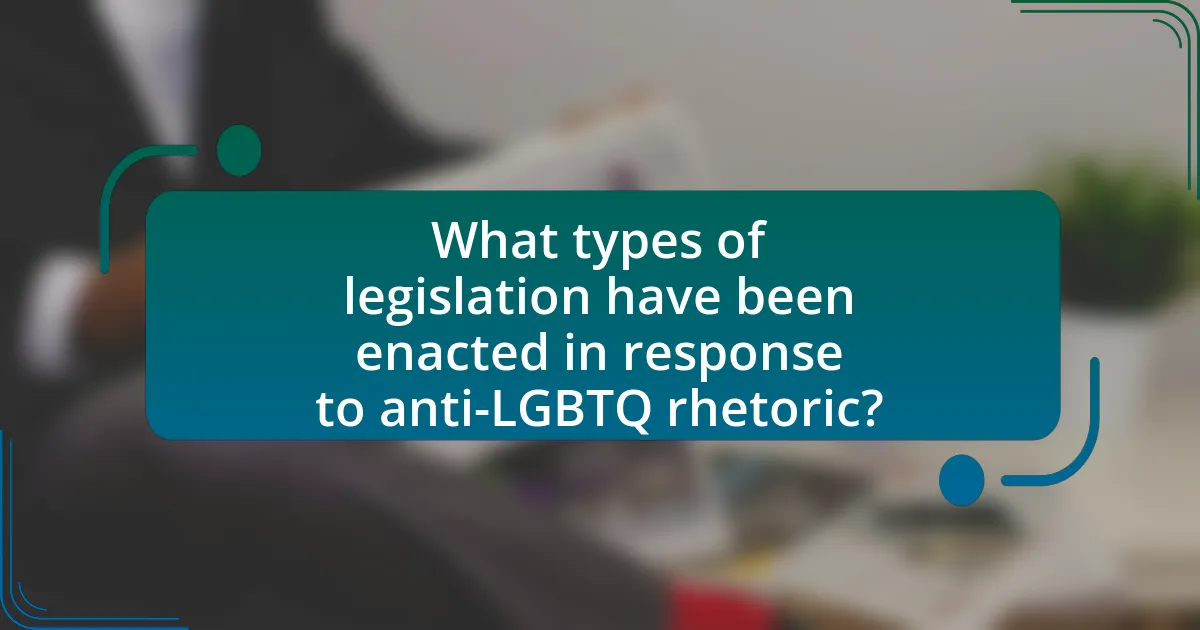
What types of legislation have been enacted in response to anti-LGBTQ rhetoric?
Various types of legislation have been enacted in response to anti-LGBTQ rhetoric, including non-discrimination laws, hate crime enhancements, and protections for LGBTQ youth. Non-discrimination laws prohibit discrimination based on sexual orientation and gender identity in areas such as employment, housing, and public accommodations, with states like California and New York implementing comprehensive protections. Hate crime enhancements increase penalties for crimes motivated by anti-LGBTQ bias, as seen in federal legislation like the Matthew Shepard and James Byrd, Jr. Hate Crimes Prevention Act of 2009. Additionally, laws aimed at protecting LGBTQ youth, such as bans on conversion therapy, have been enacted in several states, reflecting a legislative commitment to counteract harmful rhetoric and practices.
What are the key categories of legislative measures?
The key categories of legislative measures include statutory laws, regulations, and ordinances. Statutory laws are enacted by legislative bodies and establish legal standards, while regulations are rules created by governmental agencies to implement statutes. Ordinances are local laws passed by municipalities or counties. These categories are essential for understanding how laws are structured and enforced in response to various issues, including anti-LGBTQ rhetoric, as they provide the framework for legal protections and rights.
How do anti-discrimination laws function?
Anti-discrimination laws function by prohibiting unfair treatment based on specific characteristics such as race, gender, sexual orientation, and disability. These laws create a legal framework that allows individuals to seek redress when they experience discrimination in various settings, including employment, housing, and public accommodations. For instance, the Civil Rights Act of 1964 in the United States prohibits discrimination based on race, color, religion, sex, or national origin, establishing a precedent for protecting marginalized groups. Additionally, the Equal Employment Opportunity Commission (EEOC) enforces federal laws against employment discrimination, providing mechanisms for individuals to file complaints and seek remedies.
What role do hate crime laws play in addressing anti-LGBTQ rhetoric?
Hate crime laws serve a critical role in addressing anti-LGBTQ rhetoric by providing legal frameworks that enhance penalties for crimes motivated by bias against sexual orientation or gender identity. These laws signal societal condemnation of hate-based violence and discrimination, thereby deterring potential offenders. For instance, the FBI reported that in 2020, 20.5% of hate crimes were motivated by sexual orientation bias, highlighting the need for robust legal protections. By categorizing anti-LGBTQ acts as hate crimes, these laws not only facilitate more severe legal repercussions but also promote awareness and understanding of the impact of such rhetoric on LGBTQ communities.
How have recent legislative trends evolved in response to anti-LGBTQ rhetoric?
Recent legislative trends have increasingly focused on protecting LGBTQ rights in response to rising anti-LGBTQ rhetoric. For instance, numerous states have enacted laws aimed at safeguarding LGBTQ individuals from discrimination, such as the Equality Act introduced in Congress, which seeks to amend the Civil Rights Act to include sexual orientation and gender identity as protected categories. Additionally, some states have implemented policies that explicitly prohibit conversion therapy for minors, reflecting a legislative pushback against harmful practices associated with anti-LGBTQ sentiments. These trends indicate a significant shift towards affirming LGBTQ rights amid a backdrop of heightened anti-LGBTQ discourse, as evidenced by the introduction of over 300 anti-LGBTQ bills in various state legislatures in recent years, prompting a counter-response from advocates and lawmakers committed to equality.
What significant changes have occurred in the last decade?
Significant changes in the last decade regarding legislative responses to anti-LGBTQ rhetoric include the introduction and passage of numerous laws aimed at protecting LGBTQ rights and countering discrimination. For instance, the legalization of same-sex marriage in the United States was solidified by the Supreme Court’s decision in Obergefell v. Hodges in 2015, which established marriage equality nationwide. Additionally, many states have enacted laws prohibiting discrimination based on sexual orientation and gender identity in employment, housing, and public accommodations. According to the Human Rights Campaign, as of 2023, over 20 states have implemented comprehensive non-discrimination laws, reflecting a growing recognition of LGBTQ rights. Furthermore, there has been a notable increase in the number of local and state governments adopting policies to protect LGBTQ youth, particularly in response to anti-transgender legislation. These legislative advancements demonstrate a significant shift towards greater acceptance and legal protection for LGBTQ individuals over the past decade.
How do these trends reflect societal attitudes towards LGBTQ individuals?
Trends in legislative responses to anti-LGBTQ rhetoric indicate a growing societal acceptance and support for LGBTQ individuals. For instance, the increasing number of states enacting laws that protect LGBTQ rights, such as marriage equality and anti-discrimination protections, reflects a shift towards inclusivity. According to a 2021 Gallup poll, 70% of Americans support same-sex marriage, demonstrating a significant change in public opinion over the past two decades. This legislative progress aligns with broader societal attitudes that increasingly favor equality and acceptance for LGBTQ individuals, as evidenced by the rise in LGBTQ representation in media and public life.
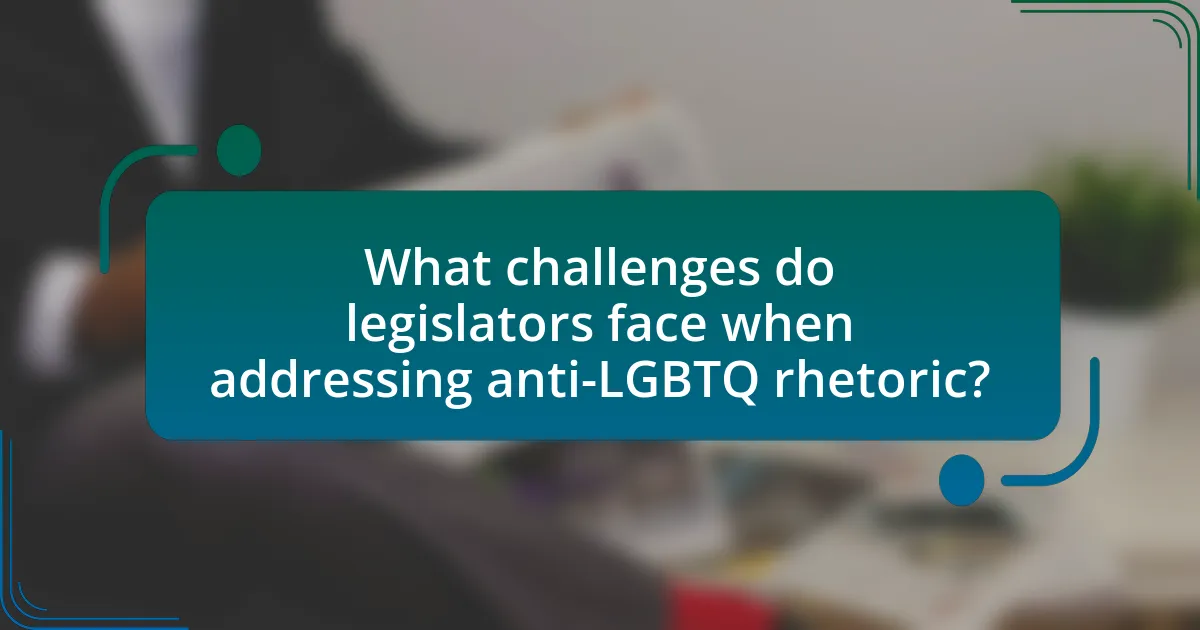
What challenges do legislators face when addressing anti-LGBTQ rhetoric?
Legislators face significant challenges when addressing anti-LGBTQ rhetoric, primarily due to the polarized political climate and the influence of public opinion. The divisive nature of LGBTQ issues often leads to backlash from constituents who hold strong anti-LGBTQ views, making it difficult for legislators to advocate for inclusive policies without risking their political careers. Additionally, misinformation and stereotypes perpetuated by anti-LGBTQ groups complicate the legislative process, as lawmakers must counteract these narratives while promoting factual information about LGBTQ rights and protections. For instance, a 2021 report by the Human Rights Campaign highlighted that over 100 anti-LGBTQ bills were introduced in various state legislatures, reflecting the organized efforts against LGBTQ equality and the challenges legislators face in combating such rhetoric effectively.
What are the common obstacles to passing effective legislation?
Common obstacles to passing effective legislation include political polarization, lack of bipartisan support, and insufficient public awareness or advocacy. Political polarization often leads to gridlock, where opposing parties refuse to collaborate, hindering the legislative process. For instance, in the U.S. Congress, significant divisions between Democrats and Republicans have resulted in numerous bills failing to advance. Lack of bipartisan support can prevent legislation from gaining the necessary votes to pass, as seen in various LGBTQ-related bills that struggle to attract cross-party backing. Additionally, insufficient public awareness or advocacy can limit pressure on lawmakers to act, as demonstrated by the slow progress of LGBTQ rights legislation in areas where public support is weak.
How do political divisions impact legislative efforts?
Political divisions significantly hinder legislative efforts by creating gridlock and reducing bipartisan cooperation. When lawmakers are divided along party lines, as seen in the context of anti-LGBTQ rhetoric, it becomes challenging to pass inclusive legislation or to respond effectively to discriminatory policies. For instance, during the debates over the Equality Act, partisan divisions led to stalled progress, with many Republican lawmakers opposing measures aimed at protecting LGBTQ rights. This polarization results in a lack of consensus, making it difficult to achieve legislative goals that require broad support across the political spectrum.
What role does misinformation play in shaping public opinion?
Misinformation significantly influences public opinion by distorting perceptions and beliefs about issues, including those related to LGBTQ rights. Research indicates that misinformation can lead to increased polarization and reinforce existing biases, as individuals often accept false narratives that align with their preconceptions. For instance, a study published in the journal “Political Communication” found that exposure to misleading information about LGBTQ policies can sway public attitudes, resulting in greater opposition to legislative measures aimed at protecting LGBTQ rights. This manipulation of information creates an environment where misconceptions thrive, ultimately shaping the legislative landscape and public discourse surrounding LGBTQ issues.
How can advocates support legislative efforts against anti-LGBTQ rhetoric?
Advocates can support legislative efforts against anti-LGBTQ rhetoric by actively engaging in lobbying for inclusive policies and legislation that protect LGBTQ rights. This includes mobilizing community members to contact their representatives, participating in public hearings, and providing testimonies that highlight the harmful impacts of anti-LGBTQ rhetoric. Research shows that states with strong advocacy efforts have seen significant legislative advancements, such as the introduction of bills that promote equality and protect against discrimination. For instance, the Human Rights Campaign reported that in 2021, states with active advocacy groups successfully passed over 100 pro-LGBTQ bills, demonstrating the effectiveness of organized efforts in shaping legislative outcomes.
What strategies can be employed to raise awareness and influence policy?
To raise awareness and influence policy regarding anti-LGBTQ rhetoric, advocacy groups can employ strategies such as grassroots mobilization, targeted media campaigns, and coalition building. Grassroots mobilization involves organizing community members to participate in demonstrations, town hall meetings, and lobbying efforts, which can effectively demonstrate public support for LGBTQ rights. Targeted media campaigns utilize social media platforms and traditional media to disseminate information, counter misinformation, and highlight personal stories that resonate with broader audiences. Coalition building among diverse organizations enhances credibility and amplifies voices, creating a unified front that can exert greater pressure on policymakers. Research indicates that these strategies have historically led to significant legislative changes, such as the legalization of same-sex marriage in various jurisdictions, showcasing their effectiveness in influencing policy.
How can community engagement enhance legislative advocacy?
Community engagement enhances legislative advocacy by fostering a direct connection between lawmakers and constituents, ensuring that the voices of the community are heard in the legislative process. When community members actively participate in advocacy efforts, they provide lawmakers with valuable insights into the needs and concerns of their constituents, which can lead to more informed decision-making. For instance, studies have shown that engaged communities can influence policy outcomes; a report by the National Civic League indicates that communities with high levels of civic engagement are more likely to see their priorities reflected in local legislation. This dynamic not only strengthens the relationship between legislators and the public but also increases the likelihood of passing legislation that addresses specific community issues, such as those related to anti-LGBTQ rhetoric.
What best practices should legislators consider when crafting responses to anti-LGBTQ rhetoric?
Legislators should prioritize inclusive language and factual rebuttals when crafting responses to anti-LGBTQ rhetoric. Utilizing clear, respectful communication can help counteract misinformation and foster understanding. For instance, studies show that inclusive policies and language can reduce discrimination and promote acceptance, as evidenced by the Human Rights Campaign’s findings on the positive impact of supportive legislation on LGBTQ communities. Additionally, legislators should engage with LGBTQ advocacy groups to ensure that responses reflect the needs and perspectives of those directly affected, thereby enhancing the credibility and effectiveness of their messaging.
